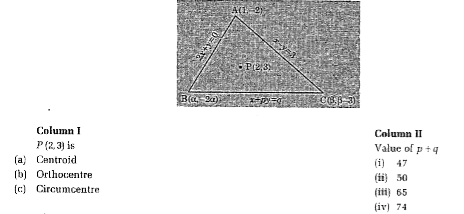The equations of the sides AB and CA of a ΔABC are x+2y=0 and x−y=3 respectively. Given a fixed point P(2, 3).
Q. Let the equation of BC is x+py=q. Then the value of (p+q) if P be the centroid of the ΔABC is :
14
-14
22
-22
The correct Answer is:D
Step by step video, text & image solution for The equations of the sides AB and CA of a DeltaABC are x+2y=0 and x-y=3 respectively. Given a fixed point P(2, 3). Q. Let the equation of BC is x+py=q. Then the value of (p+q) if P be the centroid of the DeltaABC is : by Maths experts to help you in doubts & scoring excellent marks in Class 12 exams.
Updated on:21/07/2023Topper's Solved these Questions
- STRAIGHT LINES BOOK - VIKAS GUPTA (BLACK BOOK)CHAPTER - STRAIGHT LINES EXERCISE - Exercise-5 : Subjective Type Problems
10 Videos
- STRAIGHT LINES BOOK - VIKAS GUPTA (BLACK BOOK)CHAPTER - STRAIGHT LINES EXERCISE - Exercise-2 : One or More than One Answer is/are Correct
12 Videos
- SOLUTION OF TRIANGLESBOOK - VIKAS GUPTA (BLACK BOOK)CHAPTER - SOLUTION OF TRIANGLESEXERCISE - Exercise-5 : Subjective Type Problems
12 Videos
- TRIGONOMETRIC EQUATIONS BOOK - VIKAS GUPTA (BLACK BOOK)CHAPTER - TRIGONOMETRIC EQUATIONS EXERCISE - Exercise-5 : Subjective Type Problems
9 Videos
Similar Questions
Consider a ΔABC whose sides AB,BCandCA are represented by the straight lines 2x+y=0,x+py=qandx−y=3 respectively. The point P is (2,3). If P is orthocentre,then find the value of (p+q) is
View SolutionIn the adjoining figure the sides AB,BC and CA of the triangle ABC are 2x+y=0,x+py=q and x−y=3 respectively. The point P inside the triangle is (2,3) then match the entries of column I and column II.

View Solution
Knowledge Check
The equations of the sides AB and CA of a ΔABC are x+2y=0 and x−y=3 respectively. Given a fixed point P(2, 3).
Q. If P be orthocentre of ΔABC then equation of side BC is :Ay+5=0By−5=0C5y+1=0D5y−1=0The equations of perpendicular bisectors of the sides AB and AC of a ΔABC are x−y+5=0 and x+2y=0, respectively. If the point A is (1, - 2) the equation of the line BC is
A23x+14−40=0B23+14y+40=0C14x+23y−40=0D14x+23y+40=0The equations of perpendicular bisectors of the sides AB and AC of a ΔABC are x−y+5=0 and x+2y=0, respectively. If the point A is (1, - 2) the equation of the line BC is
A23x+14y−40B23x+14y+40=0C14x+23y−40=0D14x+23y+40=0
A line cuts two sides AB and AC of ΔABC at points P and Q respectively. Prove A(ΔAPQ)A(ΔABC)=AP×AQAB×AC.
View SolutionLet the equations of side BC and the internal angle bisector of angle B of ΔABC are 2x−5y+a=0 and y+x=0 respectively. If A=(2,3), then the value of of a is equal to
View SolutionLet the equations of perpendicular bisectors of sides ACandABofΔABCbex+y=3 and x-y=1respectivelyThen vertex A is is (0,0)
Length of side BC of the ΔABC is
View SolutionGiven three points P,Q,R with P(5,3) and R lies on the x-axis. If equation of RQ is x−2y=2 and PQ is parallel to the x-axis, then the centroid of ΔPQR lies on the line:
View SolutionGiven three points P, Q, R with P (5, 3) and R lies on the x-axis. If equation of RQ is x−2y=2 and PQ is parallel to x-axis, then centroid of ΔPQR lies on the line
View Solution
